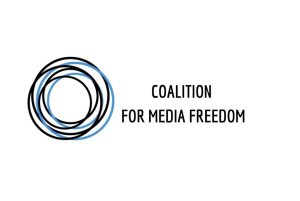Independent Journalists’ Association of Serbia (IJAS) strongly condemns the arrogant and inappropriate behavior of state officials during the presentation of the “Digital Europe” program. On that occasion, in the building of the Science and Technology Park in Belgrade, after the presentation by the President of the Government Ana Brnanic, Minister of Culture and Information Mihailo Jovanovic, EU Ambassador Emanuel Ziofre, as well as the Director of the Science and Technology Park Gordana Danilovic-Grkovic, journalists were kept locked in one room, and physically it was impossible to get statements from the Prime Minister and others present after the event.
After avoiding statements and frequent targeting of journalists, government representatives pursued a new method – physically preventing journalists from asking questions and obtaining information. IJAS indicates that it is the last moment for government representatives to stop belittling and humiliating journalists, to accept them as equal partners in the process of democratization of society and allow full freedom of expression.
Prime Minister Brnabic, as well as other politicians, must understand that journalists are the voice of the citizens – the voice of democracy and that the media without information cannot effectively perform their work and function as one of the guardians of democracy.
At the same time, the lack of reaction of the head of the delegation, Emmanuel Joffre, to this behavior of the government representatives is worrying. After all, the European Commission, in the proposal of the European Law on Media Freedom, recognizes journalism as a public good.
The Law on Public Information and Media prescribes that freedom of public information may not be violated by abuse of official position and public authority, and that journalists may not be physically restricted in their movement, nor the freedom of reporting (Article 4). The holder of public and political office is obliged to tolerate the expression of critical opinions, which relate to the results of his work, i.e. the policy he/she implements (Article 8), therefore to allow a question to be asked, to provide an answer to that question, and to receive justified criticism of his/her work. The European Court of Human Rights determines that the limits of acceptable criticism are wider for politicians because politicians inevitably and consciously expose themselves to detailed analysis of their every word and action by journalists and the public, and they must allow this criticism.
This behavior of politicians led to the fact that Serbia recorded the largest decline in media freedom in the region, according to a Reporter without Borders Serbia report. It states that Serbia is in 91st place, instead of last year’s 79th, according to the media freedom index, and thus recorded a drop of 12 index points. The report states, among other things, that the legal framework is solid, that political pressure is exerted on journalists, and that the crimes committed against them remain unpunished.
In Belgrade, 28.07.2023
Independent Journalists’ Association of Serbia (IJAS)




